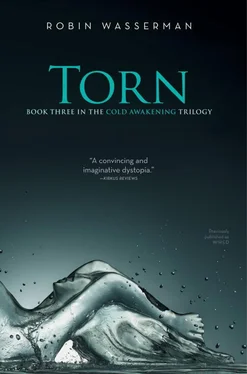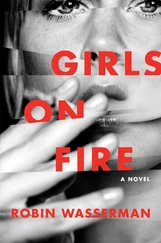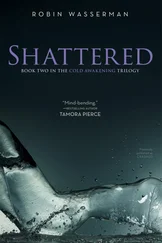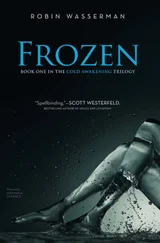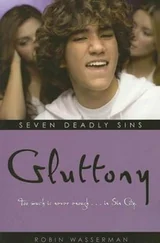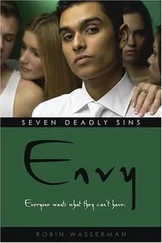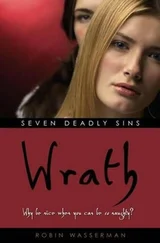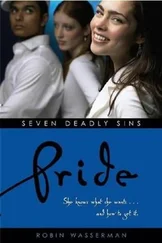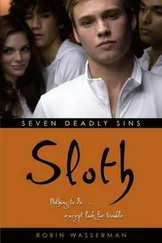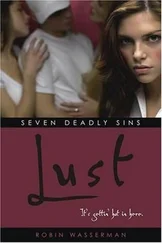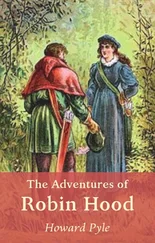Zo was watching from across the room. She caught my eye and flashed me her cheesiest thumbs-up.
“Hi, Dad.” I smiled.
There was a flicker of surprise, then it was gone. He nodded, casually, like he’d expected nothing less than an affable greeting from his beloved daughter. “Lia. Good to see you.”
“And you.” He couldn’t see into my head, I reminded myself. He couldn’t see anything unless I let him. “How have you been?”
“Well. Very well. And you?”
We went back and forth, saying nothing, for endless minutes. He was putting on a show for whoever was watching, although almost surely no one was. I waited it out, letting him squirm, because my next move would be less suspicious if he made it for me, thinking it was his own idea. Finally, success: “Would you like to go somewhere more private?” he asked. “Perhaps somewhere we could talk?”
“That would be nice.” Formal and proper. I smiled again, letting a dash of pain filter into it, so he would understand I was struggling with the decision, overcoming my own natural inclinations to run. He led me into a private office—our father never attended events like this without lining up a private sanctum to which he could retreat in time of need—and settled at one end of a small couch.
The thought of joining him made my skin crawl. I did it anyway.
“Lia.” He stopped, swallowed hard, looked down, then, thinking better of it, forced himself to face me. I stared at the door, watching him out of the corner of my eye. “I didn’t expect you’d want to talk to me.”
“I don’t.” It couldn’t be too easy, or he’d never believe it, no matter how much he wanted to.
“But…”
“But I’m here,” I said. “You’re my father, whatever happened. So… I’m here.” I sat flagpole straight, facing forward, hands gripping the edge of the cushion like I was priming myself to run.
“I’m sorry,” he said. “I don’t know what else to say. I never meant to hurt you.”
After all this time, he hadn’t managed to come up with anything better than the world’s oldest, lamest excuse? Sorry I had you murdered. Who knew it would hurt?
“I know,” I said.
“You do?”
I closed my eyes for a long moment, let him think I was grappling with a decision, opening a door. I turned and met his gaze. “I know,” I said again. “It must have been an impossible situation for you. I can’t even imagine, having to pick between two children, but…” I reminded myself that Zo would never have to hear what I said next. That they were just words. “You picked me. You wanted me to live. And in a twisted way, I guess… that proves how much you love me.”
This was the tricky part. My father wasn’t the touchy-feely type. I let my shoulders slump and tried to make myself look smaller. Weak. “I thought it would be easy to run away. From everything. From you. But now I’m… I’m so alone. I don’t know who I am, if I’m not your daughter.” I lowered my head. Let my voice shake. “I don’t know how to forgive you. But I don’t know how not to forgive you.”
I hugged my arms over my chest and waited, closing my eyes so that I wouldn’t have to look at him. A moment later I felt his weight shift on the couch, and then his arms were around me. “I’m here,” he said. His hug was as stiff and awkward as ever. “I’m your father, nothing will ever change that. You are my daughter. And I’ve never been so proud of you.”
If only he knew.
“I love you,” he said.
That’s when I stuck him. It was quick and nearly painless, a sharp pinprick on the back of his neck, where it wouldn’t leave a mark, and even as he reached to feel for a bump or a bite, his arm dropped to his side, and then, as the toxin worked its way through his system, he slumped back on the couch, unconscious.
I didn’t ask Jude where he’d gotten the sleep serum, or the microjector. That was the whole point of Jude: He got things. He’d assured me that it was harmless, with no lasting effects. I hadn’t asked about that, either.
I stood, staring down at my father, his suit rumpled, spittle dripping from the corner of his mouth. Messy and vulnerable, the two things he’d sworn never to be.
“I could kill you right now,” I said.
His eyes fluttered. Could he hear me? “It’s better this way,” I told him, hoping he could, even if he wouldn’t remember. “I’d rather be a machine than have to walk around carrying your disgusting genes.” I had looked like him, that’s what everyone had always said. “I’d rather be a machine than be any part of you. I’d rather be dead.”
It was self-indulgent, wasting time like this.
Not to mention pathetic, giving voice to all the things I was too cowardly to tell him when he was awake. Someday, I promised myself. Then I slipped the ViM from his front pocket and pressed his index finger against the nanotape Zo had given me, recording a fresh, clean print. As a final touch, I propped his head on a pillow, leaving the downer glass overturned by his fingertips. He’d think he slipped into the office to get away from it all, dosed more than he’d planned, and zoned out. If all went well, he’d still be out when we returned, and I could slide the ViM back into his pocket. It would be like nothing had happened.
Jude said he wouldn’t remember any of this, not the dosing, not the conversation that came before it. He would wake up with a headache, wondering how he’d ended up in the office, wondering why he’d fallen so soundly asleep, never remembering the way I’d humiliated myself before him, accepting his pathetic apology. Or the way he’d humiliated himself by believing me.
I texted Zo to let her know we were ready for the next step. Then it was time for Jude’s cue: Ten minutes, I texted him. Then go.
I slipped back into the thick of the party, swapping facetious small talk with some BioMax functionary whose name I could never remember, trying to follow his boring story of vacationing at some domed golf resort and scoring a hole in one while a lightning storm raged overhead, but all I could think was, Any second now, come on, now, now.
Now.
The doors blew open. Jude and his crew of mechs stormed the banquet hall, megaphones blaring the same message as the giant LED boards they carried: SAVONA LIES! The ten mechs elbowed their way into the crowd, hooting and shouting, leaping on tables and chairs and, in one memorable case, the shoulders of a particularly tall and broad corp exec. As they scattered, they released periodic bursts of neon smoke that curled itself into accusatory slogans before puffing into thin air.
The crowd exploded into a mixture of cheers and boos. There were a few high-pitched screams, some laughter, several panicked calls for security—and a hundred slack-jawed, wide-eyed, mind-blown orgs gaping at the wild mechs, backing away whenever one threatened to come near. BioMax reps scuttled back and forth trying to catch the interlopers, but Jude and his cronies zigzagged through the crowd, using orgs as shields and buffers, leaping over furniture and, when necessary, throwing handfuls of cocktail wieners and popcorn shrimp at their pursuers. It was, in the purest sense of the word, anarchy.
And two weeks ago it would have killed me. I stood at the center of the storm, watching Jude tear down everything I’d worked for, knowing it would play on the network for weeks, in constant loops and mashups, the demented mechs bent on sowing destruction through org society.
Exactly as we’d planned.
The crowd was too dense for any kind of effective security protocol—and there were too many witnesses for any kind of violence, especially against the very mechs that BioMax claimed to be so desperate to protect. Which was how Jude managed to weave his way through the orgs all the way to the dais at the front of the room. He clambered up on stage and, as the BioMax reps pushed their way through an increasingly uncooperative crowd, unleashed his j’accuse on Savona: a litany of his crimes, a list of every mech who’d been attacked, lynched, battered, bruised by the hatred stoked by Savona and his Brothers. Name after name after name. It was transfixing.
Читать дальше
